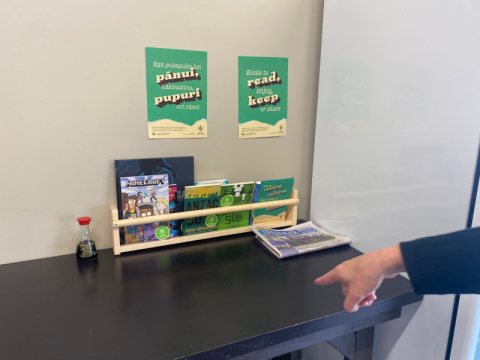
Dargaville is geographically isolated. It is 55 kilometres to Whangārei, 174 to Tāmaki Makaurau, and a walk to your closest bookstore is a casual six-and-a-half hour stroll along the banks of the Wairoa River to Ruawai.
But what Dargaville might lack in a local Paper Plus, it more than makes up for with a fantastic public library that was at the heart of Dargaville’s Pūtoi Rito Communities of Readers project. A guerilla campaign to promote reading in Dargaville saw dozens of custom painted bookshelves, brimming with hundreds of titles, emerge in some of the most unlikely places you could expect. Given the success of the initiative, you could make the argument that Dargaville doesn’t even need a bookstore.
Building reading for pleasure from the ground up
Pūtoi Rito is an initiative from National Library of New Zealand Te Puna Matauranga o Aotearoa, which sees them collaborate with communities and individuals across New Zealand to grow reading for pleasure for children and young people.
The project funded one of the librarians from the Dargaville Public Library to work part-time as Project Co-ordinator, leading initiatives to build reading for pleasure among Dargaville’s tamariki. She worked with the National Library to build connections across the community and with schools, while also approaching swathes of the Dargaville community.
The plan was simple: rather than bring people to the library, they would bring the library to the people. Bookshelves were built by students from the local intermediate school, painted by the Dargaville Menzshed, stocked by the National Library and hosted by local cafes, social agencies, small businesses, even a meatworks and a kumara packhouse. Wherever people went in Dargaville, they were reminded of the pleasure of reading.

The Project Co-ordinator was critical to all of this coming together. She shoulder-tapped staff at businesses and organisations who she knew would be good at promoting the books, or who were, themselves keen readers. These staff connected with the community, encouraged people to read the books and choose one to keep or share. They became reading champions for the project and took great pride in their role. The bookshelf hosts had many positive stories to tell of the impact the books had on those they engaged with.
Then there were events run by the public library to promote the project, such as the ‘book or trick’ event run at Halloween, in which children could come into the library and choose a Pūtoi Rito book as a ‘treat’. Staff from the public library and National Library also attended community organised events such as the Dargaville Field Days where they had a stand of Pūtoi Rito books, along with other attractions, such as a game created using robots which could be borrowed from the public library for free.
New regulars, and a new normal
The project provided the opportunity for staff from the public library and National Library to work together, and more intensively than usual, with schools – setting up staffroom bookshelves and frequently re-stocking them, delivering teacher PLD and helping to refresh school libraries. The project funded the ReadNZ Writers in Schools Scheme, and a range of New Zealand authors visited the schools to talk about books, reading, and writing – as did the current Reading Ambassador, Alan Dingley. Teachers were reminded of the joy of reading and began reading more themselves as well as to children. School staff observed students reading and talking about books and using the library more often. Librarians also noticed ‘new regulars’ visiting the public library.
Many factors contributed to the success of the Pūtoi Rito project in Dargaville. The most important was bringing together a wide range of people with local community knowledge, relevant expertise, and a passion for reading.
You can read all Pūtoi Rito case studies – including the Dargaville one from NZCER – over at the National Library’s website.





Add new comment